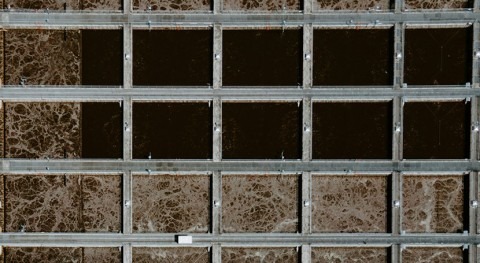A first-of-its-kind project to use gas from sewage waste to produce clean hydrogen is being delivered at United Utilities’ largest wastewater treatment works in Manchester.
The water company for the North West has joined forces with leading Cambridge-based climate tech firm Levidian to demonstrate the opportunity for biogas produced from wastewater to create hydrogen and super-material graphene – the thinnest and strongest material ever to be discovered.
The trial is taking place at Manchester Bioresources Centre, part of Davyhulme Wastewater Treatment Works, where modern-day sewage treatment processes were first developed back in 1914.
Research has identified the opportunity for biogas generated from sewage waste to be used to produce up to 75,000 tonnes of hydrogen a year – enough to fuel over 40% of all UK bus and coach journeys
Supported by the Department for Energy Security and Net Zero’s Hydrogen BECCS Innovation Programme, Levidian’s LOOP device uses electromagnetic waves to split methane gas (CH4) into hydrogen and carbon, capturing the carbon in solid form as graphene. The lower carbon blend gas is then fed into United Utilities’ onsite generator where it is burned to help power the site.
The graphene produced has a multitude of use cases, from extending the life of tyres and driving down the carbon footprint of concrete, to boosting the performance of batteries and solar panels or creating cut resistant fibres.
Research by the firms has identified the opportunity for biogas generated from sewage waste to be used as a fully sustainable feedstock to produce up to 75,000 tonnes of hydrogen a year – enough to fuel over 40% of all UK bus and coach journeys - playing a key role in the UK’s transition to net zero.
Potential uses for hydrogen include a clean fuel for industrial processes, zero carbon transport such as HGVs or blended into the national gas network to reduce the emissions associated with heating homes and cooking on gas*.
Tom Lissett, Bioresource and Green Energy Director at United Utilities, said: “This trial is a world first, and it’s exciting to deliver it here in Manchester.
“We already use sewage sludge as a sustainable feedstock for renewable energy and biomethane production and this project brings potential to really build on that.
“We’re actively talking to partners across the North West about the role we can play in decarbonising the region and this is a great example of where we could make a positive contribution. We currently inject some of the biogas we produce into the gas network and we’re exploring how we can support the development of the hydrogen network in the region.
“Since it was built in 1894, Davyhulme has played an important role in the development of wastewater treatment. When scientists here first developed the processes that would go on to be used around the world, I’m sure they couldn’t imagine just how far they would develop to enable us to harness something that most people think of as a waste product, into a useful resource. It is a great example of a circular economy in action.”
Levidian aims to produce the cheapest hydrogen anywhere in the world thanks to the production of high value graphene.
John Hartley, CEO of Levidian, said: “Hydrogen is set to play a critical role in meeting the UK’s legally binding commitment to achieve net zero by 2050 but is currently being held back due to the cost of production – an issue we hope to unlock here in Manchester as we continue to scale our LOOP technology to industrial levels.”
Alongside this trial, United Utilities is exploring the potential to scale up use of the technology to increase hydrogen production at Davyhulme and other sites across the North West.


















